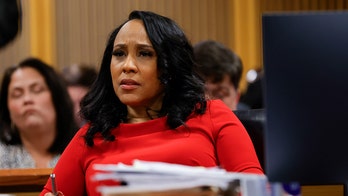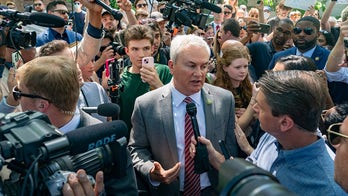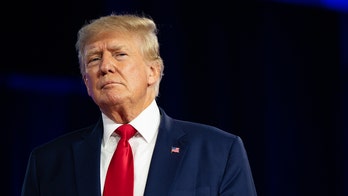They have been taking aim at each other from afar – through ads and interviews on television, radio and the Internet.
They’ve dispatched surrogates – including their wives – to promote them and their ideas, and persuade the vast and diverse electorate of the United States that they are the best man for the job of president.
Now, in a few hours, President Barack Obama and his Republican challenger, former Massachusetts Gov. Mitt Romney, will face each other in the first of three televised debates.
Wednesday night the two will face off at the University of Denver, where Jim Lehrer, host of PBS’s NewsHour, will serve as the sole moderator.
The debate, which is scheduled to begin at 9 p.m. (Eastern time), is expected to last until 10:30 p.m. (or till 9:30 Central time and 7:30 Pacific time) and will focus on domestic policy. The format for this debate calls for it to be made up of six segments, each devoting approximately 15 minutes to a certain topic.
Lehrer will open each segment with a question, and each candidate is expected to respond with a two-minute answer.
In the headlines on the day of the debate are statements by the Romney campaign that the candidate, if elected, would not continue an Obama administration program that aims to suspend deportation and issue work permits for undocumented immigrants brought to the United States as minors who meet a strict set of criteria; several polls show Obama’s lead among likely voters nationwide narrowing, 49 percent to 46 percent; but Romney, whose campaign said was striving for 38 percent of Latino voters, has support of barely 21 percent, while Obama’s popularity among them is soaring to over 70 percent, according to new polls.
The slow economic recovery, the huge deficit and unemployed are expected to be among the issues covered in the debate.
Any gem of a line, or dud of a gaffe, will be reported in real time, tweeted and retweeted, posted on Facebook and discussed with hundreds, even thousands of comments before the debate even concludes. And of course, there’ll be the video of those high and low moments too, to be played and replayed.
If the Obama’s campaign talking points pop up in the debate, the president may well make reference to Romney’s controversial “47 percent” remark, captured in a leaked video of a fundraiser earlier this year, where the Republican candidate said that was the percentage of people who are dependent on the government and have a victim mindset.
More recently, Vice President Joe Biden said during a campaign speech that the middle class has been “buried” for the last four years – the duration of his boss’s tenure. Obama’s campaign said the statement was misunderstood, but Republicans have run with it, saying that even the president’s own right-hand man acknowledged how detrimental his administration’s policies have been for millions of Americans.
Political experts vary on how much debates really matter on Election Day results. Many feel that they rarely sway people who already are leaning in favor of a certain candidate, and that at most the debates might help the undecided determine whom they will support.
Others say that a strong performance can boost momentum, and a weak one – or a gaffe that dominates everything else a candidate may have said in the debate – can create doubts about qualifications to lead a world superpower.
Going into the first televised debate, in 1960, Richard Nixon was in a strong position, but television favored the charismatic and witty John F. Kennedy, and highlighted Nixon’s discomfort with the press, making it a game-changer.
But candidates can, and have, bounced back from a flubbed debate.
Ronald Reagan at times appeared confused in a 1984 debate against Walter Mondale, spurring questions among critics about his age and ability to continue as president. But later, Reagan, who generally felt comfortable in the spotlight and had the gift of ad-libbing, rebounded, turning the age issue against Mondale, whom he characterized as younger and inexperienced.
And of course, certain lines in debates have outlived the candidates who uttered them. Among them: Reagan’s “There you go again,” and "Are you better off now than you were four years ago?"
Then there was Democratic vice presidential candidate Texas Sen. Lloyd Bentsen’s retort to his GOP counterpart, Sen. Dan Quayle, who routinely compared himself to John F. Kennedy.
Prepared when Quayle again raised the comparison, Bentsen responded: "Senator, I served with Jack Kennedy. I knew Jack Kennedy. Jack Kennedy was a friend of mine. Senator, you are no Jack Kennedy."
Today, no doubt, those lines would have reverberated all over social media, especially on Twitter, which never has been a factor on the scale that it is this year.
Any gem of a line, or dud of a gaffe, will be reported in real time, tweeted and retweeted, posted on Facebook and discussed with hundreds, even thousands of comments before the debate even concludes.
And of course, there’ll be the video of those high and low moments too, to be played and replayed.
Texas Gov. Rick Perry got a taste of that during the GOP primary debates when he drew a blank and looked nearly incoherent as he tried to recall the name of the Department of Education.
Social media, indeed, will give these debates an entirely new dimension.
The next two presidential debates are scheduled for Oct. 16 and Oct. 22.
The Oct. 16 debate will take place at Hofstra University in New York, and cover both domestic and foreign issues. The format will be a town hall meeting; CNN’s chief political correspondent Candy Crowley will be the moderator.
The Oct. 22 debate is scheduled to take place at Lynn University in Florida, and will focus on foreign policy.
Bob Schieffer, host of Face the Nation on CBS, will moderate and follow a format similar to that of the first debate.
One vice presidential debate is scheduled for Oct. 11, and will take place at Centre College in Kentucky. It is expected to cover both domestic and foreign policy, and be divided into nine 10-minute segments. ABC foreign correspondent Martha Raddatz will be the moderator.




